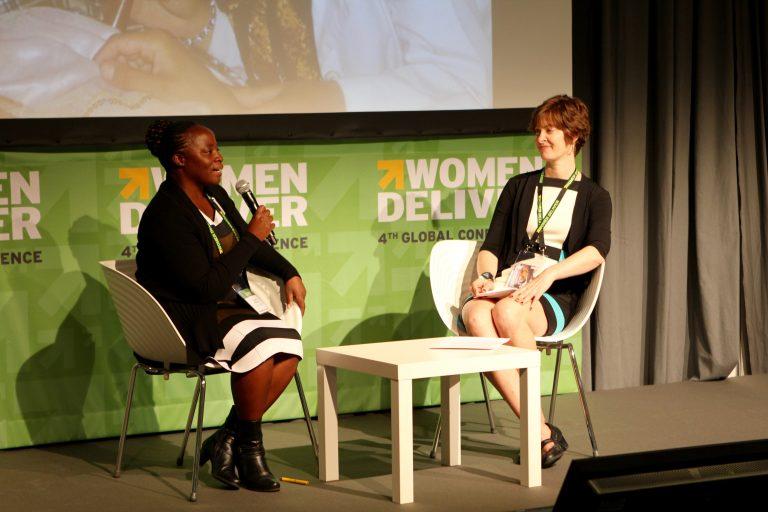Where We Work
See our interactive map


“If we can empower frontline health workers, we empower women, we empower families, and we empower the whole community.” —Dr. Marjorie Makukula, Lecturer at the Department of Nursing, School of Medicine, University of ZambiaCOPENHAGEN—Sunday night, before Women Deliver 2016 officially opened this week, a full house of conference attendees came early to the Bella Center—and for good reason. Three women working on the front lines of health from Bangladesh, Uganda, and Zambia were telling their stories: stories of struggle, stories of opportunity, stories of empowerment.
“What saves a mother?” Eva Nangalo, a midwife from Nakaseke Hospital in central Uganda, asked the audience. “We do. We know what to do, and we shall save many. Invest in us!”Nangalo joined fellow storytellers Dr. Rina Rani Paul, who is working diligently to train community health workers in rural Bangladesh, and Dr. Marjorie Makakula, a nurse who has brought her experience working in rural Zambia to developing a national curriculum for frontline health workers in her country.
I was born to be a midwife. But the journey to become one was not easy.
“When we’re talking about human resources, we’re talking about human beings,” said Excellency Toyin Ojora-Saraki, president and founder of Wellbeing Foundation Africa, during the opening of the reception. “And this is what we must remember going forward in policy discourse: human beings and their stories.”
The Women behind the Stories
“I was born to be a midwife,” a woman named Eva told the audience. “But the journey to become one was not easy.”
Against the wishes of her father, Eva entered a Ugandan midwifery school and learned that out of the 103 new entrants, she was the only one who did not have an advanced level of secondary schooling. But what she lacked in qualifications, she made up for in passion and hard work.
“The other students used to leave me alone on the ward and go home or to the disco,” she said. “I would stay on to learn and help the midwives.”
Two-and-a-half years later, her hard work paid off. Only 26 of the 103 students completed the course, and Nangalo was second in her class. Since then, she has helped countless mothers deliver babies.Dr. Rina Rani Paul has devoted her career to helping health workers in the most remote stretches of Bangladesh, a country that has less than one skilled provider per 1,000 people. Doctors like her are important, she told the audience, but frontline community health workers are essential to reach the lowest quintile. “Frontline health workers in insolated communities reach women both geographically and socioeconomically,” Rina said.
At age 19, and fresh out of nursing school, Dr. Makakula was assigned a post in rural Zambia
“At first I was so scared and lonely,” she said. “I was away from my family and friends for the first time. And we had limited resources. When you have limited resources, it is hard to help.” This experience, however, showed her the importance of frontline health workers for the economic empowerment of women, especially in remote, rural settings.
When you have a skilled health worker in a village, you empower every person in that village to live a healthy life.
Marjorie decided to further her education in a doctorate program and research the role of nurses in providing primary health care to those communities and to develop curricula that would build the capacity of frontline health workers in those rural low-resourced areas.
“When you have a skilled health worker in a village, you empower every person in that village to live a healthy life,” Marjorie said. “Women who are healthy are empowered.”
#HealthWorkersCountParticipants of Sunday’s reception were also reminded of the rights issues that must be addressed in order to unleash the potential for economic empowerment of women on the front lines of care.
“Becoming a frontline health worker can economically empower women only if their human, economic, and labor rights are respected, promoted, and protected in the health systems in which they work,” said Constance Newman, senior team leader gender equality and health at IntraHealth International. Women in the health workforce are underpaid, with less opportunity for advancement and decision-making, and have less opportunity for career advancement. International agreements such as the Sustainable Development Goals target the changes needed, and civil society must hold governments accountable for those commitments, she said.
To do so, the advocates at Women Deliver must join efforts to advocate for frontline health workers, said Vince Blaser, director of the Frontline Health Workers Coalition.
“If you’re a women’s advocate or a gender equality advocate,” he said, “you should be a health workforce advocate too.”
Julia Bluestone, chair of the Frontline Health Workers Coalition and senior technical advisor of Jhpiego’s Global Learning Office, moderated the discussions at a reception hosted by the coalition, CARE, GlaxoSmithKline, IntraHealth International, Jhpiego, and Johnson & Johnson.
This post originally appeared on the Frontline Health Workers Coalition blog.
Get the latest updates from the blog and eNews




